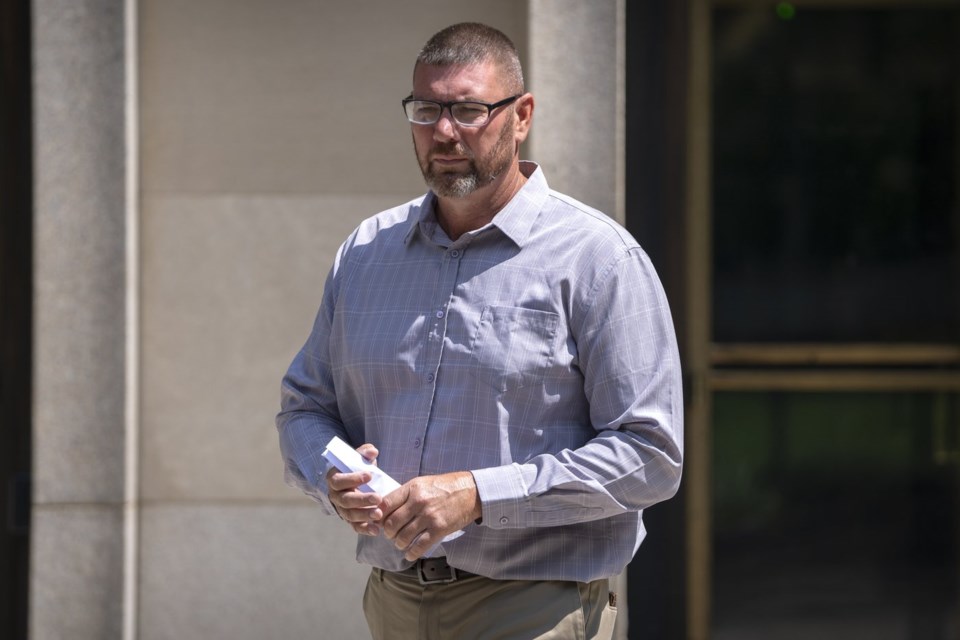WASHINGTON (AP) — A Kentucky man who was the first rioter to enter the U.S. Capitol during a mob's attack on the building was sentenced on Tuesday to more than four years in prison.
A police officer who tried to subdue Michael Sparks with pepper spray described him as a catalyst for the . The Senate that day recessed less than one minute after Sparks jumped into the building through a broken window. Sparks then joined other rioters in chasing a police officer up flights of stairs.
Before learning his sentencing, Sparks told the judge that he still believes the 2020 presidential election was marred by fraud and “completely taken from the American public."
“I am remorseful that what transpired that day didn't help anybody,” Sparks said. “I am remorseful that our country is in the state it's in.”
U.S. District Judge Timothy Kelly, who sentenced Sparks to four years and five months, told him that there was nothing patriotic about his prominent role in what was a “national disgrace.”
“I don't really think you appreciate the full gravity of what happened that day and, quite frankly, the full seriousness of what you did,” the judge said.
Federal prosecutors of four years and nine months for Sparks, a 47-year-old former factory worker from Cecilia, Kentucky.
Defense attorney Scott Wendelsdorf to sentence Sparks to one year of home detention instead of prison.
A jury of all six charges that he faced, including a felony count of interfering with police during a civil disorder. Sparks didn’t testify at his trial in Washington, D.C.
In the weeks leading up to the Jan. 6 attack, Sparks used social media to promote conspiracy theories about election fraud and advocate for a civil war.
“It’s time to drag them out of Congress. It’s tyranny,” he posted on Facebook three days before the riot.
Sparks traveled to Washington, D.C, with co-workers from an electronics and components plant in Elizabethtown, Kentucky. They attended then-President Donald Trump’s “Stop the Steal” rally near the White House on Jan. 6.
After the rally, Sparks and a friend, , joined a crowd in marching to the Capitol. Both of them wore tactical vests. Howe was captured on video repeatedly saying, “we’re getting in that building.”
Off camera, Sparks added: “All it’s going to take is one person to go. The rest is following," according to prosecutors. Sparks' attorney argued that the evidence doesn't prove that Sparks made that statement.
“Of course, both Sparks and Howe were more right than perhaps anyone else knew at the time — it was just a short time later that Sparks made history as the very first person to go inside, and the rest indeed followed,” prosecutors wrote.
Dominic Pezzola, a member of the far-right Proud Boys extremist group, used a police shield to break a window next to the Senate Wing Door. Capitol Police Sgt. Victor Nichols sprayed Sparks in the face as he hopped through the shattered glass.
Nichols testified that Sparks acted “like a green light for everybody behind him, and everyone followed right behind him because it was like it was okay to go into the building.” Nichols also said Sparks’ actions were “the catalyst for the building being completely breached.”
Undeterred by pepper spray, Sparks joined other rioters in chasing Capitol Police Officer Eugene Goodman as he retreated up the stairs and found backup from other officers near the Senate chamber.
“This is our America!” Sparks screamed at police. He left the building about 10 minutes later.
Sparks' attorney downplayed his client's distinction as the first rioter to enter the building.
“While technically true in a time-line sense, he did not lead the crowd into the building or cause the breach through which he and others entered," Wendelsdorf wrote. "Actually, there were eight different points of access that day separately and independently exploited by the protestors.”
But the judge said when and where Sparks entered the Capitol was an important factor in his sentencing.
“I think it's undeniable that the first person" to enter the Capitol "would have an emboldening and encouraging effect on everyone who was at least in your vicinity,” Kelly told Sparks. “To say it wasn't a material, key point in the mob's taking of the Capitol, I think, is just ignoring the obvious.”
Sparks was arrested in Kentucky less than a month after the riot. Sparks and Howe were charged together in a November 2022 indictment. Howe pleaded guilty to assault and obstruction charges and was sentenced last year to four years and two months in prison.
More than 1,400 people have been charged with Capitol riot-related federal crimes. Approximately 950 riot defendants have been convicted and sentenced. More than 600 of them have received terms of imprisonment ranging from a few days to 22 years.
Michael Kunzelman, The Associated Press




